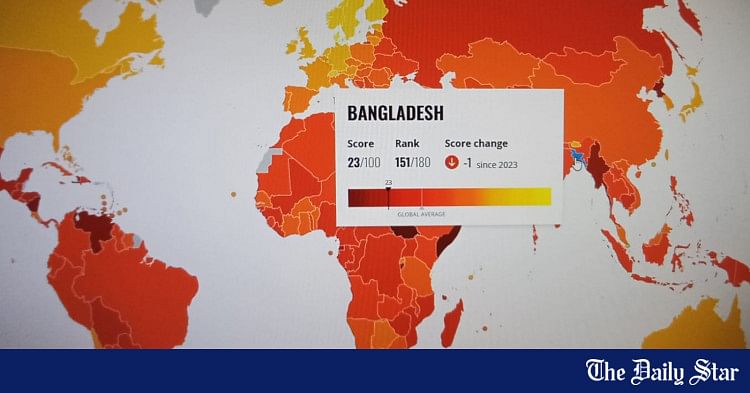Despite scoring lower in Transparency International’s Corruption Perceptions Index, Bangladesh has moved four notches up since the situation worsened in other countries as well.
It scored 23 out of 100 in CPI 2024, one point lower than the previous year and the lowest in 13 years, indicating that corruption remains a significant concern.
With this score, the country ranked 151st among 180 countries. In 2023, it ranked 149th. Since 2012, Bangladesh’s score fluctuated between 25 and 28, but in 2023, it declined to 24.
According to the CPI 2024 released yesterday, Bangladesh was 14th from the bottom, second lowest in South Asia, and fifth lowest in the Asia-Pacific region. Only Afghanistan is behind Bangladesh in South Asia.
The fall in Bangladesh’s score proves that while the previous authoritarian regime talked about fighting corruption, in reality, it fostered, supported, and even participated in corruption, observed Transparency International Bangladesh (TIB).
“The performance is extremely disappointing,” Dr Iftekharuzzaman, executive director of TIB, said at a press conference marking the publication of CPI 2024.
Bangladesh is among 122 countries with lower scores than the global average of 43. The country is also among 101 nations classified as having a “very serious corruption problem”, Iftekharuzzaman said.
He said widespread public sector corruption, particularly in public procurement and project implementation, is a key reason behind Bangladesh’s continued poor performance.
He also noted that while Bangladesh’s score declined, the scores of other countries dropped more.
“Our score has dropped, but since the decline in other countries was deeper, our relative position appears somewhat better.
“Such a score is extremely concerning and disappointing. Our ranking has fallen significantly compared to previous years,” he added.
Iftekharuzzaman emphasised the need for positive changes in the country’s political and bureaucratic culture to effectively control corruption.
“Without these changes, reform will not be possible, no matter how much we talk about it,” he said.
The Berlin-based graft watchdog also stated in the report that risks persist in terms of freedom of dissent, free media and civil space.
It has been publishing the report every year since 1995. When Bangladesh was included in 2001, the country was ranked the lowest with a score of 0.4 out of 10 and held the same position until 2005.
Like last year, the TI took into account data from eight international surveys conducted in Bangladesh between November 2021 and September 2024. No nationally generated data, including the TIB research, were considered.
The TI prepares the CPI based on the perception of corruption, mainly in the public sector, particularly bribery, the use of public office for private gain, diversion of public funds, nepotism in public sector appointments, red tape, and groups with narrow vested interests given a free rein in capturing policy.
South Sudan was ranked as the most corrupt country with a score of just eight, and Denmark remained the least corrupt country for the third year in a row with a score of 90.
Bhutan made a remarkable development in curbing corruption as it topped the list of South Asian countries by scoring 72, eight points up from last year. Nepal also moved up one notch, scoring 34.
The theme of this year’s CPI is “Corruption and the Climate Crisis”.
At the press conference, Iftekharuzzaman said, “According to the current analysis of the index, Bangladesh is at the level of countries that are losing control over corruption. The level of corruption in Bangladesh is extremely alarming.”
Analysing Bangladesh’s position, he said, “Our score is lower than the countries that are at the lowest level in the indicators of civil liberties and human development.”
Even compared to the most corrupt regions, such as Sub-Saharan African countries, Bangladesh’s score is 10 points lower, he said.
The TIB executive director said the money laundered from Bangladesh is going to countries that are in better positions according to the index.
“So, while Bangladesh is responsible for the corruption in the country and the failure to prevent money laundering, the overall responsibility is not of Bangladesh alone.”
Iftekharuzzaman said there is no scope for a complete analysis of the interim government’s tenure in the index. However, even after the fall of the previous authoritarian regime, evidence of continued abuse of power and corrupt practices persist in political and governance space as a change of turn, he added.
WAY FORWARD
Iftekharuzzaman called for the implementation of the Anti-Corruption Reform Commission’s recommendations in accordance with the proposed roadmap, with a particular emphasis on reforming the ACC to make it truly independent and accountable.
He urged authorities to set concrete examples of success by prioritising the accountability of high-level corrupt individuals and entities.
He also emphasised the need to depoliticise state institutions to ensure professional integrity and excellence, particularly within the ACC, bureaucracy, law enforcement, and judicial services.
Additionally, Iftekharuzzaman advocated for rescuing strategically crucial sectors of public interest from the grip of policy capture, conflicts of interest, partisan politics and other influences. These sectors include public procurement, banking, trade, power and energy, health, education, land, and infrastructure.
Iftekharuzzaman also called for ensuring freedom of the media, civil society, and the general public to freely disclose, report, and comment on corruption.
He stressed the need to transform political culture and practices to eliminate the use of political and public positions as a licence for personal gain.


